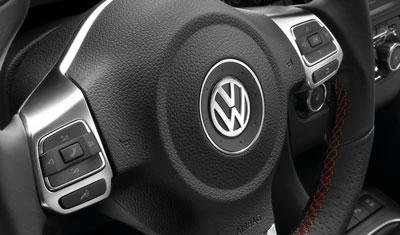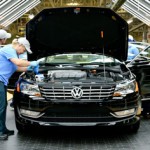VW faces tougher Justice Department while GM and Toyota settled criminal charges without pleading guilty

-
Government making `big deal’ of company’s emissions cheating
-
GM, Toyota settled criminal charges without pleading guilty
No one has died from the emissions-cheating software Volkswagen AG has admitted it installed in some of its cars, yet the U.S. Justice Department may treat it more harshly than two automakers whose vehicles have killed people.
General Motors Co. vehicles were fitted with faulty ignition switches linked to at least 124 deaths. Toyota Motor Corp. cars were involved in unintended acceleration responsible for at least four deaths. Neither had to plead guilty in settling criminal allegations, but Volkswagen may be forced to if it’s charged with criminal conduct and also wants to settle, according to attorneys who specialize in environmental law.
The German automaker lied to the Environmental Protection Agency and California regulators for almost a year before admitting it created a device to fool emissions tests, Mary D. Nichols, chair of the California Air Resources Board, said in September. Now the company faces a Justice Department that’s become more willing to push businesses across industries into guilty pleas tied to multibillion-dollar penalties. The U.S. attorney general also made it a priority last year to pursue criminal convictions against corporate executives.
“We’ve had difficulty in controlling the automobile industry,” said Daniel Riesel, a partner at Sive, Paget & Riesel, an environmental law firm in New York that isn’t involved in the case. “Clearly the government regards this as a very serious environmental dereliction and is making a big deal of it.”
The Environment and Natural Resources Division of the Justice Department filed a civil lawsuit against Volkswagen on Jan. 4 and is following a process similar to its civil suit against BP Plc after the 2010 Deepwater Horizon offshore oil spill, according to a department official who asked not to be cited by name because of the active litigation. In BP, the U.S. coordinated its case with those by private plaintiffs. The government has linked its case against Volkswagen with consumer suits that are now before one California judge.
The similarities between the cases refer only to the process, not the severity of environmental damage or the potential penalties. The BP disaster was the worst offshore spill in U.S. history, and the London-based company agreed last year to pay a total of $20.8 billion to resolve government civil claims under the Clean Water Act and Oil Pollution Act, including economic-damage claims from regional authorities. In 2012, BP agreed to plead guilty and pay $4 billion in a separate criminal investigation.
The U.S. filed its civil claim almost two years before forcing the oil company’s plea. The Justice Department opened a criminal probe last year into Volkswagen’s emissions cheating, two people familiar with the inquiry said in September; it hasn’t filed charges against the company.
Wyn Hornbuckle, a Justice Department spokesman, declined to comment. Volkswagen also declined to comment as investigations are continuing, spokesman Eric Felber said.
‘Deeply Shocked’
On Sept. 25, the company’s supervisory board released a statement saying, “There is absolutely no excuse for the manipulations which have deeply shocked Volkswagen. The company will leave no stone unturned in getting to the bottom of this, will call those responsible to account and take the necessary actions.”
Volkswagen’s obfuscation about emissions-test discrepancies began seven months after Toyota paid $1.2 billion to settle criminal charges of wire fraud. It also came in the midst of GM’s ignition-switch crisis, which ended with the Detroit-based automaker paying a $900 million fine to settle criminal allegations of wire fraud and conspiracy. Neither company was prosecuted.
Industry Alert
These cases “should have put the industry on alert on what was expected,” said Scott Fulton, president of the Environmental Law Institute, a research and analysis group in Washington, and a former EPA general counsel. “There is such reliance on self-regulation that it really does threaten the system as a whole when one part of it is manipulated.”
Volkswagen eventually told the EPA and the California Environmental Protection Agency’s Air Resources Board in September that it installed a so-called defeat device on certain vehicles to cheat on diesel emissions. Since then it has sparred with officials about testing additional models and hasn’t yet reached agreement on fixes and recalls for cars that exceed pollution standards. This leaves them on the road, potentially deepening the automaker’s environmental debt and regulators’ calculations of potential harm.
“Excess emissions” from Volkswagen vehicles with the defeat devices “will cause 59 early deaths in the U.S.,” according an estimate in a study by researchers at the Massachusetts Institute of Technology and Harvard University. If the company recalls all affected cars by year-end, another 130 premature deaths may be avoided, the study projected.
Potential Fines
The U.S. civil complaint against Volkswagen alleges four violations of the Clean Air Act and cites potential civil fines that could be in the billions of dollars, according to Justice Department officials who asked not to be named because they aren’t authorized to comment publicly. If the BP case is a guide, criminal penalties could be less costly.
A criminal claim probably would be based on allegations that Volkswagen lied to government officials, said David Uhlmann, a law professor at the University of Michigan in Ann Arbor and former head of the environmental-crimes section of the Justice Department’s Environment and Natural Resources Division. When confronted about excess emissions by EPA and California regulators in meetings over several months, Volkswagen engineers cited technical issues rather than admitting the engines contained the defeat devices, according to the Justice Department. The company also initially denied in November that it installed software in larger engines to alter emissions, the department said.
“Use of defeat devices is a civil violation” of the Clean Air Act, Uhlmann said. “Lying about CAA compliance is a criminal violation.”
Concerted Effort
GM made a concerted effort to cooperate with the U.S. government investigation, which the Justice Department noted when it announced the $900 million settlement in September 2015.
“GM has taken exemplary actions to demonstrate acceptance and acknowledgment of responsibility for its conduct,” it said in a statement.
The U.S. was more critical of Toyota, saying in court papers that the Toyota City, Japan-based company misled the public and regulators in recalls and initially hid a “sticky pedal” defect from regulators.
James Cain, a GM spokesman, declined to comment. Steven Curtis, a Toyota spokesman, also declined to comment.
Both settlements were part of deferred-prosecution agreements that require the companies to cooperate with authorities. The charges will be dismissed in three years if the automakers comply with the accords.
Harmful Pollution
Volkswagen may not get that option.“There is no excuse for hiding harmful pollution, and the Environment Division — which is investigating VW — almost never agrees to deferred prosecution,” Uhlmann said.
Such agreements and the fines the automakers paid aren’t enough to compel significant behavior changes, according to Rena Steinzor, a law professor at the University of Maryland and author of “Why Not Jail? Industrial Catastrophes, Corporate Malfeasance, and Government Inaction.” Only by forcing companies in criminal cases to plead guilty and prosecuting individuals can government action have a real impact, she said.
The U.S. has asked German prosecutors to share evidence from their investigation into Volkswagen’s manipulation, and officials had an initial meeting in Berlin to discuss how to work together, Klaus Ziehe, a spokesman for prosecutors in Braunschweig, said last month.
The Justice Department’s increased willingness to pursue large fines tied to guilty pleas has produced a series of multibillion-dollar penalties in the past two years. French bank BNP Paribas SA, for example, pleaded guilty to U.S. sanctions violations involving Sudan, Iran and Cuba last year and paid $8.97 billion to settle the criminal case.
By installing the defeat device in its vehicles, Volkswagen “actually conspired to break the law,” Steinzor said. “I don’t see how they could walk away without some intensive criminal investigation.”
Source: Bloomberg



























